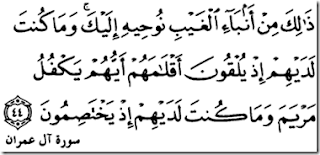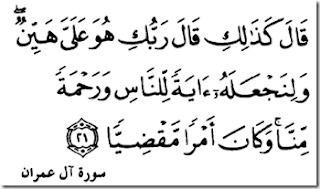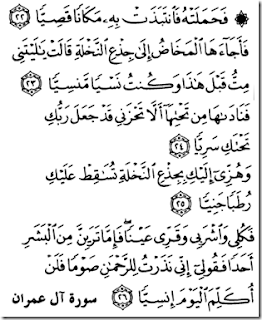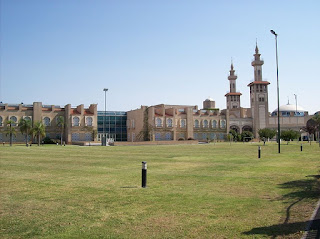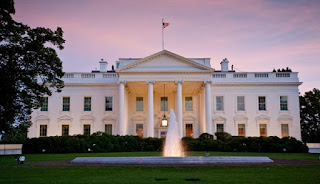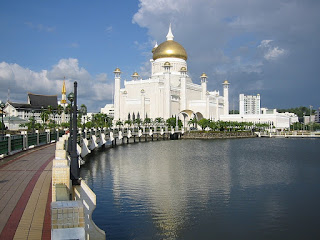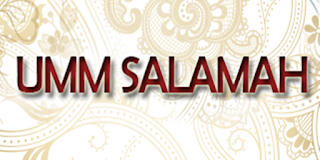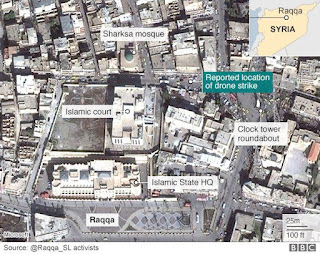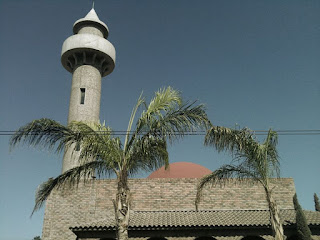Maryam’s birth and her guardianship
The Quran has covered the birth of Maryam in Surah Al Imran’s verse number 35 and 36. In Tafsir ibn Kathir (one of Quran’s widely recognized interpretations), Ismail ibn Kathir has elaborated on these two verses (through narrations from others) and provided information about Maryam’s parents. According to him, the name of Maryam’s father was ‘Imran’. He was an imam (prayer leader) in Bayt Al-Maqdis (Al-Aqsa site in Jerusalem.) Bayt Al-Maqdis at that time was under the care of the descendents of Prophet Harun (Aron), the brother of Prophet Moosa (Moses). Imran was a very pious man and well respected by those who took care of religious affairs in Bayt Al-Maqdis. The name of Imran’s wife was Hannah bint Faqudh (Hannah daughter of Faqudh) (Kathir I. , Tafsir Ibn Kathir, p. 771).
According to Ibn Kathir, Hannah didn’t have any children before Maryam. One day, she saw a bird feeding its chick. Seeing that, her longing for a child grew intense and thus she made a sincere prayer to Allah (God) to grant her an offspring. In that prayer she made a promise to Allah that if He gave her an offspring, she would dedicate her child to His worship and in taking care of the holy places in Bayt Al-Maqdis. Hannah’s prayers were accepted, and soon she became pregnant. The Quran narrates her response in the following verse:
O my Lord! I have vowed to you what (the child that) is in my womb to be dedicated for your services (free from all worldly work; to serve Your Place of worship), so accept this from me. Verily, you are the All-Hearer, the All-Knowing
Quran (Surah Aal-e-Imran, Verse 35)
And after giving birth Hannah said (as narrated in the Quran):
Then when she gave birth to her [child Maryam (Mary)], she said: “O my Lord! I have given birth to a female child,” – and Allah knew better what she brought forth, – “And the male is not like the female, and I have named her Maryam (Mary), and I seek refuge with you (Allah) for her and for her offspring from Shaitan (Satan), the outcast”.
Quran (Surah Aal-e-Imran, Verse 36)
After the birth of Maryam, Hannah decided that she would fulfill her promise and give the newly born child to the service of Bayt-Al Maqdis. The Quran recorded this event in the following verse:
This is a part of the news of the Ghaib (unseen, i.e. the news of the past nations of which you have no knowledge) which We reveal to you (O Muhammad) You were not with them, when they cast lots with their pens as to which of them should be charged with the care of Maryam (Mary); nor were you with them when they disputed
Quran (Surah Aal-e-Imran, Verse 44).
Ibn Kathir explains the above mentioned verse by stating the whole story in detail as described below:
Maryam’s mother left with Maryam, carrying her in her infant cloth, and took her to the rabbis from the offspring of Aaron, the brother of Prophet Moses. They were responsible for taking care of Bayt Al-Maqdis (the Masjid) at that time, just as there were those who took care of the Kaabah (in Makkah). Maryam’s mother said to them, “Take this child whom I vowed – to serve the Masjid, I have set her free, since she is my daughter, for no menstruating woman should enter the Masjid, and I shall not take her back home.” They said, “She is the daughter of our Imam, as Imran used to lead them in prayer, “who took care of our sacrificial rituals.” Zakariyya said, “Give her to me, for her maternal aunt is my wife.” They said, “Our hearts cannot bear that you take her, for she is the daughter of our Imam.” So they conducted a lottery with the pens with which they wrote the Tawrah, and Zakariyya won the lottery and took Maryam into his care
(Kathir I. , Tafsir Ibn Kathir, p. 763).
Ibn Kathir also gives an account of the lottery as follows:
Rabbis went into the Jordan River and conducted a lottery there, deciding to throw their pens into the river. The pen that remained afloat and idle would indicate that its owner would take care of Maryam. When they threw their pens into the river, the water took all the pens under, except Zakariyya’s pen, which remained afloat in its place. Zakariyya was also their master, chief, scholar, Imam and Prophet, may Allah’s peace and blessings are on him and the rest of the Prophets
(Kathir I. , Tafsir Ibn Kathir, p. 763).
Thus, Maryam came under the guardianship of Prophet Zikariyya (Zechariah).
Life of Maryam (Jesus’ Mother)
Maryam’s guardian Zakariyya (who was the husband of Maryam’s maternal aunt) was a very pious man and took good care of Maryam and raised her well. As Maryam became older, she devoted herself to the worship of Allah. Maryam fulfilled the promise of her mother and dedicated her life to the worship of Allah. She was modest, honorable, innocent, and dedicated to her task of worship.
The following hadith by Prophet Muhammad (Pbuh) shows the extent of Maryam’s dedication to her worship:
The best woman (in her time) was Maryam, daughter of Imran, and the best woman (of the Prophet’s time) is Khadijah (his wife), daughter of Khuwaylid (Kathir I. , Tafsir Ibn Kathir, p. 763).
Maryam’s piety did not remain unobserved by Zakariyya. According to the Quran, whenever Zakariyya went to visit Maryam, he found her with food and supplies and he wondered about its source and asked her about it to which she used to respond that the food came from Allah. The Quran confirms this through the following verse:
So her Lord (Allah) accepted her with goodly acceptance. He made her grow in a good manner and put her under the care of Zakariyya (Zachariya). Every time he entered Al-Mihrab to (visit) her, he found her supplied with sustenance. He said: “O Maryam (Mary)! From where have you got this?” She said, “This is from Allah.” Verily, Allah provides sustenance to whom He wills, without limit
Quran (Surah Aal-e-Imran, Verse 37).
Birth of Jesus (Prophet Eesa)
As Maryam grew, she found out about her status of the chosen one.
The Quran states:
42. And (remember) when the angels said: “O Maryam (Mary)! Verily, Allah has chosen you, purified you (from polytheism and disbelief), and chosen you above the women of the ‘Alamin (mankind and jinn) (of her lifetime).
43. O Mary! Submit yourself with obedience to your Lord (Allah, by worshipping none but Him Alone) and prostrate yourself, and Irkai (bow down) along with Ar-Rakiun (those who bow down).
Quran (Surah Aal-e-Imran, Verses 42-43).
45. (Remember) when the angels said: “O Maryam (Mary)! Verily, Allah gives you the glad tidings of a Word [“Be!”- And he was! i.e. Eesa (Jesus) the son of Maryam (Mary)] from Him, his name will be the Messiah Eesa (Jesus), the son of Maryam (Mary), held in honor in this world and in the Hereafter, and will be one of those who are near to Allah.
46. He will speak to the people in the cradle and in manhood he will be one of the righteous”
Quran (Surah Aal-e-Imran, Verses 45-46).
In Surah Maryam, Allah describes this instance:
16. And mention in the Book (the Quran, O Muhammad the story of) Maryam (Mary), when she withdrew in seclusion from her family to a place facing east.
17. She placed a screen (to screen herself) from them; then we sent to her Our Ruh [angel Jibril (Gabriel)], and he appeared before her in the form of a man in all respects.
18. She said: “Verily! I seek refuge with the Most Gracious (Allah) from you, if you do fear Allah.”
19. (The angel) said: “I am only a messenger from your Lord, (to announce) to you the gift of a righteous son”
Quran (Surah Maryam, Verses 16-19).
As is obvious, Maryam was upset to know that she was pregnant. And when the angel told her about this child she asked:
She said: “How can I have a son, when no man has touched me, nor am I unchaste?”
Quran (Surah Maryam, Verses 20).
Allah stated the answer of the Angel in Surah Maryam:
He said: “So (it will be), your Lord said: ‘That is easy for Me (Allah): And (We wish) to appoint him as a sign to mankind and a mercy from Us (Allah), and it is a matter (already) decreed, (by Allah)’”
Quran (Surah Maryam, Verses 21).
Although this could have caused Maryam some agony, Allah kept her safe and filled with provisions and food. Furthermore, Allah told her not to talk to anyone about the matter and to keep quiet. The Quran describes this as follows:
22. So she conceived him, and she withdrew with him to a far place (i.e. Bethlehem valley about 4-6 miles from Jerusalem).
23. And the pains of childbirth drove her to the trunk of a date-palm. She said: “Would that I had died before this, and had been forgotten and out of sight!”
24. Then [the baby Isa (Jesus) or Jibril (Gabriel)] cried unto her from below her, saying: “Grieve not: your Lord has provided a water stream under you.
25. And shake the trunk of date-palm towards you; it will let fall fresh ripe-dates upon you.
26. So eat and drink and be glad. And if you see any human being, say: ‘Verily! I have vowed a fast unto the Most Gracious (Allah) so I shall not speak to any human being this day’”
Quran (Surah Maryam, Verses 22-26).
Maryam comes back to Jerusalem
After giving birth to Prophet Isa (Jesus), Maryam came back to Jerusalem with her child. Since she was widely considered to be a pure and pious woman, the people of Jerusalem were amazed to see a child with Maryam. They asked her about his father but she said nothing and pointed to the child. This further confused the people because there was no point in asking an infant about his birth. Allah said in Surah Maryam:
27. Then she brought him (the baby) to her people, carrying him. They said: “O Mary! Indeed you have brought a thing Fariyy (a mighty thing).
28. O sister (i.e. the like) of Harun (Aaron)! Your father was not a man who used to commit adultery, nor was your mother an unchaste woman.”
29. Then she pointed to him. They said: “How can we talk to one who is a child in the cradle?”
Quran (Surah Maryam, Verses 27-29).
In his book “Stories of Prophets”, Ibn Kathir describes how Maryam came back and the Jews started asking her questions:
It was said that Joseph the Carpenter was greatly surprised when he knew the story, so he asked Mary: “Can a tree come to grow without a seed?” She said: “Yes, the one which Allah created for the first time.” He asked her again: “Is it possible to bear a child without a male partner?” She said: “Yes, Allah created Adam without male or female!” (Kathir I. , Stories of Prophets, p. 178)
Jesus speaks from the cradle
While the people (mostly Jews of the time) were taunting Maryam asking her about the child’s father, a miracle happened. The infant which was still in cradle started speaking to the Jews. The Quran mentions the words of the infant as follows:
30. He [Isa (Jesus)] said: “Verily I am a slave of Allah, He has given me the Scripture and made me a Prophet;
31. and He has made me blessed wheresoever’s I be, and has enjoined on me Salat (prayer), and Zakat, as long as I live.
32. “And dutiful to my mother, and made me not arrogant, unblest.
33. And Salam (peace) be upon me the day I was born, and the day I die, and the day I shall be raised alive!”
Quran (Surah Maryam, Verses 30-33).
There is great significance to this event in Islamic history. Muhammad bin Ishaq recorded that according to Abu Hurayrah, Prophet Muhammad said:
No infant spoke in the cradle except Isa and the companion of Jurayj (Kathir I. , Tafsir Ibn Kathir, p. 763).
Source : http://www.iqrasense.com/people-of-the-book/the-story-of-the-birth-of-prophet-jesus-eesa.html



